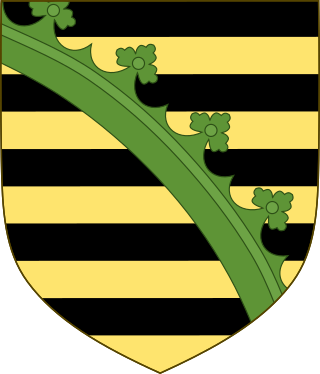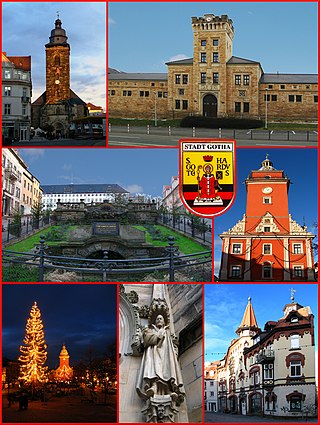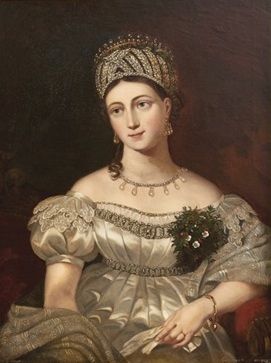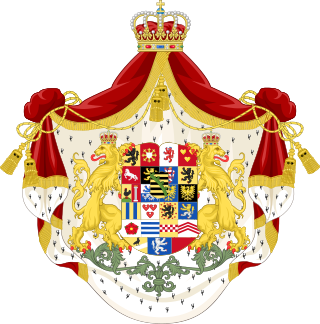Related Research Articles

Saxe-Coburg and Gotha, or Saxe-Coburg-Gotha, was an Ernestine duchy in Thuringia ruled by a branch of the House of Wettin, consisting of territories in the present-day states of Thuringia and Bavaria in Germany. It lasted from 1826 to 1918. In November 1918, Charles Edward, Duke of Saxe-Coburg and Gotha, was forced to abdicate. In 1920, the northern part of the duchy was merged with six other Thuringian free states to form the Free State of Thuringia: Saxe-Weimar-Eisenach, Saxe-Altenburg and Saxe-Meiningen, Schwarzburg-Rudolstadt and Schwarzburg-Sondershausen, as well as the People's State of Reuss. The southern part of the duchy, as southernmost of the Thuringian states, was the only one which, after a referendum, became part of the Free State of Bavaria.
Gotha is a Kreis (district) in western central Thuringia, Germany. Neighboring districts are Unstrut-Hainich-Kreis, Sömmerda, the Kreis-free city Erfurt, Ilm-Kreis, Schmalkalden-Meiningen and the Wartburgkreis.

Gothaer Waggonfabrik was a German manufacturer of rolling stock established in the late nineteenth century at Gotha. During the two world wars, the company expanded into aircraft building.

The House of Wettin was a dynasty which included Saxon kings, prince-electors, dukes, and counts, who once ruled territories in the present-day German federated states of Saxony, Saxony-Anhalt and Thuringia. The dynasty is one of the oldest in Europe, and its origins can be traced back to the town of Wettin, Saxony-Anhalt. The Wettins gradually rose to power within the Holy Roman Empire. Members of the family became the rulers of several medieval states, starting with the Saxon Eastern March in 1030. Other states they gained were Meissen in 1089, Thuringia in 1263, and Saxony in 1423. These areas cover large parts of Central Germany as a cultural area of Germany.

The Gotha G.I was a bomber aircraft used by the Luftstreitkräfte during the First World War.

Johann Matthäus Bechstein was a German naturalist, forester, ornithologist, entomologist, and herpetologist. In Great Britain, he was known for his treatise on singing birds.

Gotha is the fifth-largest city in Thuringia, Germany, 20 kilometres west of Erfurt and 25 km east of Eisenach with a population of 44,000. The city is the capital of the district of Gotha and was also a residence of the Ernestine Wettins from 1640 until the end of monarchy in Germany in 1918. The House of Saxe-Coburg and Gotha originating here spawned many European rulers, including the royal houses of the United Kingdom, Belgium, Portugal and Bulgaria.

Coburg is a town located on the Itz river in the Upper Franconia region of Bavaria, Germany. Long part of one of the Thuringian states of the Wettin line, it joined Bavaria by popular vote only in 1920. Until the revolution of 1918, it was one of the capitals of the Duchy of Saxe-Coburg and Gotha and the Duchy of Saxe-Coburg-Saalfeld.

Louise of Saxe-Gotha-Altenburg ; was the wife of Ernst I, Duke of Saxe-Coburg and Gotha and the mother of Duke Ernst II and Prince Albert, husband of Queen Victoria.

The House of Saxe-Coburg and Gotha is a European royal house. It takes its name from its oldest domain, the Ernestine duchy of Saxe-Coburg and Gotha, and its members later sat on the thrones of Belgium, Bulgaria, Portugal, and the United Kingdom and its dominions.

Saxe-Coburg-Saalfeld was one of the Saxon Duchies held by the Ernestine line of the Wettin Dynasty. Established in 1699, the Saxe-Coburg-Saalfield line lasted until the reshuffle of the Ernestine territories that occurred following the extinction of the Saxe-Gotha line in 1825, in which the Saxe-Coburg-Saalfeld line received Gotha, but lost Saalfeld to Saxe-Meiningen.

Georg Anton Benda was a composer, violinist and Kapellmeister of the classical period from the Kingdom of Bohemia.

Ernst Gunther II, Duke of Schleswig-Holstein, was a son of Frederick VIII, Duke of Schleswig-Holstein and Princess Adelheid of Hohenlohe-Langenburg. He inherited his father's title as titular third duke of Schleswig-Holstein.

The Gotha G.III was a twin-engine pusher biplane heavy bomber used by the Luftstreitkräfte during World War I. It succeeded the G.II in production and differed primarily in powerplant and in armament details. The G.II's unreliable Mercedes D.IV was replaced by the new inline six-cylinder 190 kW (250 hp) Mercedes D.IVa engine. The G.III also had an extra 7.92 mm (0.312 in) machine gun firing through a ventral gun opening to protect the underside of the tail.

Archduke Leopold Ferdinand of Austria was the eldest son of Ferdinand IV, Grand Duke of Tuscany, and Alice of Bourbon-Parma.
Events in the year 1875 in Germany.
Justus Perthes Publishers was established in 1785 in Gotha, Germany. Justus Perthes was primarily a publisher of geographical and historical atlases and educational wall maps. They published the Almanach de Gotha from 1785 to 1944, and Petermann’s Geographische Mitteilungen from 1855 to 2004. In 2016 the publisher was dissolved.
Cyriakus Schneegass was a German Lutheran pastor, hymn writer, composer and music theorist.

The House of Saxe-Coburg and Gotha-Koháry is the Catholic cadet branch of the House of Saxe-Coburg and Gotha, founded after the marriage of Prince Ferdinand of Saxe-Coburg and Gotha and Princess Maria Antonia Koháry de Csábrág. Among its descendants were the last four kings of Portugal and the last three Tsars of Bulgaria. After the change of the “House laws” by Simeon II, the present head of the house is his sister Princess Marie Louise of Bulgaria, Princess of Koháry.

Rockets is a German professional basketball team. It is originally based in Gotha, Germany but plays its home games in Erfurt. The Rockets is the first team of the BiG Gotha basketball club.
References
- 1 2 Gonschior, Andreas. "Der Freistaat Gotha Landtagswahl 1921". Wahlen in der Weimarer Republik. Archived from the original on 2003-05-25. Retrieved 18 May 2021.